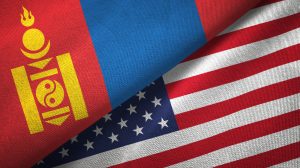In February, the fourth U.S.-Mongolia bilateral Economic Policy Dialogue convened in Washington, D.C. The bilateral meeting focused on expanding Mongolia-U.S. trade and investment in three key areas: critical minerals, clean energy, and digital economy.
The two countries established a strategic partnership in 2019, but since then their economic activities have been disrupted by the lengthy COVID-19 pandemic. More concerningly for Ulaanbaatar, the decrease in overall foreign direct investment (FDI) was a significant indication that Mongolia needs to diversify investment opportunities with all “third neighbors,” including the United States.
Between 2021 and 2022, Mongolia and the United States both appointed new ambassadors. During the bilateral Economic Policy Dialogue, Mongolian Ambassador to the U.S. Batbayar Ulziidelger and U.S. Ambassador to Mongolia Richard Buangan exchanged views and shared ideas on cooperation. Both sides acknowledged the importance of advancing economic ties and emphasizing a strong Mongolia-U.S. strategic partnership.
At the same time, given the distance and logistical challenges, the United States is not among the top destinations for Mongolia’s mineral export. However, there has been increasing interest in U.S. investment in Mongolia’s critical mineral sector. The recent economic agreement between Ulaanbaatar and Seoul highlights these economic directions as well.
The start of Rio Tinto’s $7 billion underground mega-plant in Oyu Tolgoi certainly projects an increase in the mining sector’s contribution to the national economy of Mongolia. With the successful start of the Oyu Tolgoi mega-mine, there is potential for mining critical minerals such as copper, tin, and molybdenum. The successful renegotiation of the deal between the government of Mongolia and Rio Tinto also marks an improvement for Mongolia’s dispute resolution process, which is crucial in attracting FDI.
The second area in which Mongolia and the United States are set to cooperate is the development of clean energy. Renewable energy is an emerging market in Mongolia, but the establishment and implementation of such projects can help to solve major public health issues such as air pollution.
Investments in clean energy will naturally diversify renewable energy project types. While Mongolia can adopt clean energy solutions from China and India – which have similar air pollution and public health issues – Ulaanbaatar can also utilize its third-neighbor relations to acquire advanced knowledge and tools from partners like the United States. If implemented efficiently, clean and renewable energy can be a game-changer for a country like Mongolia with a sparse population.
While the Economic Policy Dialogue is significant in advancing economic ties between Mongolia and the United States, there are shortcomings on both sides.
In 2018, one year prior to establishing their strategic partnership, the United States Congress initiated the Mongolia Third Neighbor Trade Act to boost bilateral trade, particularly in the export of textiles, cashmere, and raw materials to the United States. One of the important incentives for Ulaanbaatar to boost Mongolia-U.S. relations to a strategic level was the economic advantage it could glean. However, five years later, there is no sign of action. The Third Neighbor Trade Act has not moved since 2018, when it was referred to the House Subcommittee on Trade.
Moreover, since 2018, the trade balance between Mongolia and the United States has not been in favor of Mongolia. According to the Office of the U.S. Trade Representative, “the U.S. goods trade surplus with Mongolia was $106 million in 2020, a 36.9 percent decrease ($62 million) over 2019. U.S. goods imports from Mongolia totaled $12 million in 2020, down 52.8 percent ($13 million) from 2019.”
The Third Neighbor Trade Act was supposed to address this trade imbalance by providing duty-free access to the U.S. market for some main Mongolian exports. With the bill stalled out, the problem remains unaddressed.
At the same time, Mongolia needs to strengthen its investment environment. The 2022 US Investment Climate Statement shed light on the areas of improvement such as dispute resolution, unpredictable tax and regulatory burden, and other key judicial and court processes that may affect the flow of investment into Mongolia.
Despite these challenges concerning both sides, Mongolia and the United States continue to develop other areas of cooperation. In January, the two governments signed a Memorandum of Consultations (MOC) for the successful negotiation of an Air Transport Agreement, which has the potential of establishing a nonstop direct flight between Mongolia and the United States.
Advancing economic ties with the United States is crucial for Mongolia’s third-neighbor foreign policy, which seeks to reduce Mongolia’s dependence on its two border nations: China and Russia. While Mongolia’s outreach to “third neighbors” incorporates political, social, defense, and cultural ties and engagements, economic activities – such as trade deals and the start of development projects – are always at the top of Ulaanbaatar’s agenda.
From a macroeconomic standpoint, Mongolia’s escape from a mining-dependent economy is not realistic. Hence, investment from its third neighbors, particularly, from strategic partners, like the United States, will likely continue to take precedence. The diversification of investment and starting different development projects that are energy efficient are smart moves that can not only strengthen Mongolia’s investment profile but also have a sustainable and tangible outcome.

































